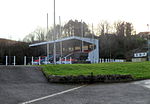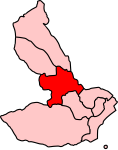Pontypridd RFC
Pontypridd Rugby Football Club (Welsh: Clwb Rygbi Pontypridd) are a rugby union team from Pontypridd, Rhondda Cynon Taf, Wales. They compete in the Indigo Group Premiership, which they won for four consecutive seasons between 2012 and 2015, and the Specsavers National Cup, which they have won on 6 occasions, with the most recent being in 2014. Established in 1876, Pontypridd RFC play their home games on the banks of the River Rhondda, at Sardis Road, Pontypridd, Rhondda Cynon Taf in Wales, with their age-grade section playing at Taff Vale Park in Pontypridd, and Pontypridd High School Fields in nearby Cilfynydd. Pontypridd RFC experienced a successful period during the 1990s under head coach, Dennis John, referred to as the club's "Golden Age", and enjoyed further success between 2001 and 2003 with the appointment of head coach, Lynn Howells. The transition to Regional Rugby in Wales in 2003 saw the downgrading of Pontypridd to a semi-professional team, followed by financial difficulties for the club, and eventual demise of Pontypridd's "Celtic Warriors" region.Pontypridd RFC have since refinanced and restructured, and, despite a mooted stadium sale, continue to be regarded as a beacon for rugby in the south Wales Valleys.Pontypridd RFC have produced numerous players for the Wales national rugby union team and have long thrived on the 'unfashionable club' tag.
Excerpt from the Wikipedia article Pontypridd RFC (License: CC BY-SA 3.0, Authors).Pontypridd RFC
Sardis Road,
Geographical coordinates (GPS) Address Nearby Places Show on map
Geographical coordinates (GPS)
| Latitude | Longitude |
|---|---|
| N 51.60046 ° | E -3.346571 ° |
Address
Sardis Road
Sardis Road
CF37 1HA
Wales, United Kingdom
Open on Google Maps









